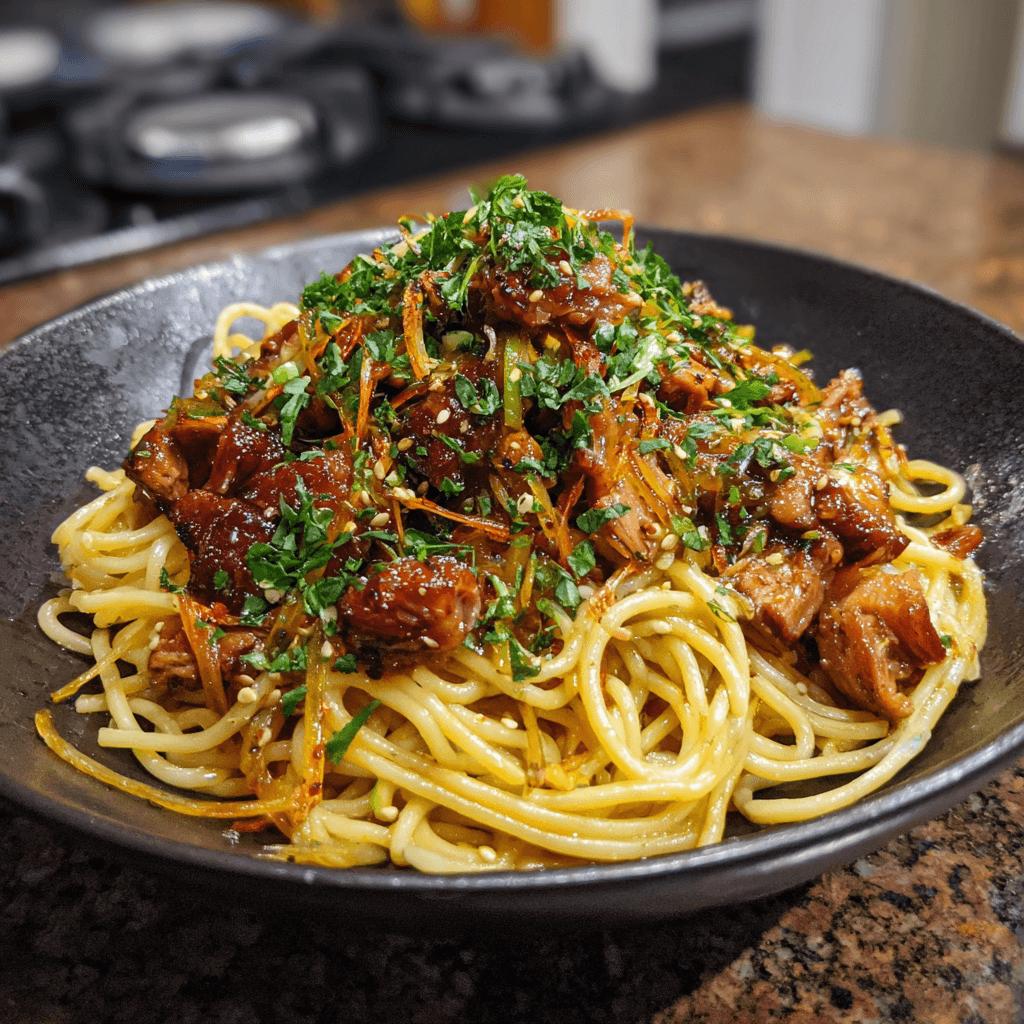Introduction
Spaghetti with Korean BBQ Pork is a delightful fusion dish that brings together the comforting familiarity of Italian pasta with the bold, savory flavors of Korean cuisine. This recipe combines tender pork marinated in a sweet and spicy Korean BBQ sauce with al dente spaghetti, creating a meal that’s both satisfying and unique.
The History
The concept of fusing Korean BBQ with spaghetti represents a growing trend in global cuisine where culinary traditions from different cultures are blended to create exciting new dishes. While not rooted in any specific historical tradition, this dish embodies the modern approach to cooking—experimentation and creativity. The marriage of these two cuisines has gained popularity thanks to the increasing appreciation for Korean flavors worldwide.
Ingredients Breakdown
- Pork: Typically pork belly or shoulder is used for its tenderness and flavor when cooked low and slow.
- Soy Sauce: Adds depth and saltiness to the marinade.
- Gochujang: A fermented chili paste that contributes heat and umami.
- Honey: Balances the spiciness with natural sweetness.
- Ginger & Garlic: Essential aromatics that enhance the overall taste profile.
- Spaghetti: Cooked until al dente to maintain texture.
- Vegetables: Optional additions like bell peppers, onions, or carrots can add color and nutrition.
Step-by-Step Recipe
- Prepare the Marinade: In a bowl, mix soy sauce, gochujang, honey, minced garlic, grated ginger, and a splash of sesame oil.
- Marinate the Pork: Slice the pork thinly and toss it in the marinade. Let it sit for at least 30 minutes (or overnight for deeper flavor).
- Cook the Pork: Heat a skillet over medium-high heat and cook the pork until browned and fully cooked through. Remove and set aside.
- Boil the Spaghetti: Cook according to package instructions until al dente. Drain and reserve some pasta water.
- Toss Together: Return the cooked pork to the skillet along with the spaghetti. Add a little reserved pasta water if needed to loosen the sauce.
- Season and Serve: Garnish with sesame seeds, green onions, and additional gochujang if desired. Serve hot!
Tips
- For extra flavor, use homemade stock instead of plain water when boiling the spaghetti.
- If you prefer less spice, adjust the amount of gochujang based on your preference.
- Add vegetables such as sliced mushrooms or spinach during the last few minutes of cooking for added nutrition and variety.
- Experiment with other proteins like chicken or beef if pork isn’t available.
Variations and Customizations
This versatile dish allows for numerous customizations:
- Vegan Option: Substitute pork with plant-based meat alternatives or tofu marinated in the same sauce.
- Gluten-Free: Use gluten-free soy sauce and ensure all ingredients are certified gluten-free.
- No Noodles: Replace spaghetti with zucchini noodles or rice for a lower-carb option.
- Additional Sauces: Incorporate hoisin or sriracha for an even bolder kick.
Health Considerations and Nutritional Value
While this dish is rich in flavor, it does contain higher levels of sodium due to the soy sauce and gochujang. To balance it out, consider reducing portion sizes or using reduced-sodium versions of these condiments. Pork provides protein, while the vegetables contribute essential vitamins and fiber. For those watching their carb intake, swapping traditional spaghetti with whole wheat or vegetable-based alternatives can help manage calorie consumption.
Ingredients
- 500g pork belly or shoulder, sliced
- 3 tbsp soy sauce
- 2 tbsp gochujang
- 1 tbsp honey
- 2 cloves garlic, minced
- 1 tsp grated fresh ginger
- 1 tsp sesame oil
- 200g spaghetti
- Sesame seeds and chopped green onions for garnish
Directions
Follow the step-by-step guide above to prepare this delicious dish. Remember to taste-test as you go and make adjustments to suit your palate.
FAQ
- Can I use ground pork instead of sliced pork?
- Yes, ground pork works well too! Simply sauté it in the marinade until fully cooked before tossing with the spaghetti.
- Is there a substitute for gochujang?
- You can try substituting with red pepper flakes mixed with ketchup for a similar effect, though it won’t be exactly the same.
- How long can I store leftovers?
- Store leftovers in an airtight container in the refrigerator for up to three days. Reheat gently on the stove or microwave.
Summary
Spaghetti with Korean BBQ Pork blends Italian comfort food with Korean spices for a globally inspired meal that’s both hearty and flavorful. By marinating pork in a blend of soy sauce, gochujang, and honey, then pairing it with perfectly cooked spaghetti, this dish offers a memorable dining experience.










